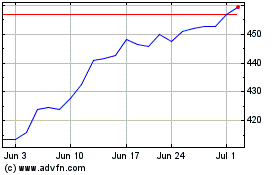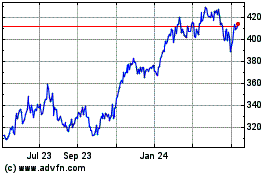Microsoft Broadens Patent Protection for Cloud Customers
February 08 2017 - 9:29AM
Dow Jones News
By Jay Greene
Microsoft Corp. on Wednesday broadened the patent-lawsuit
protection it offers its cloud-computing customers, aiming to keep
intellectual-property litigation from curtailing adoption of its
Azure service.
The program, called Microsoft Azure IP Advantage, provides
uncapped indemnification coverage -- payment for legal costs -- to
customers that develop cloud applications using open-source
technologies such as Hadoop, a tool used to analyze large amounts
of data.
Microsoft already provides such a service for Azure customers
developing apps using Microsoft technology. In its most recent
quarter, revenue for Microsoft's Intelligent Cloud segment, which
includes Azure, rose 8% to $6.9 billion, about 28% of the company's
overall sales.
The offering is the first of its kind, according to Forrester
Research Inc. analyst Jeffrey Hammond. While intellectual-property
suits targeting open-source tech use in the cloud aren't common,
the service could still lure customers, particularly those averse
to risk, he said.
"If you're one of those 25 to 30 companies that it's happened
to, it really matters to you," Mr. Hammond said.
IP Advantage is free for customers spending $1,000 or more a
month using the web-based, on-demand computing offering -- the vast
majority of Azure customers, Microsoft said.
Microsoft will make 10,000 of its patents available to Azure
customers who qualify for IP Advantage, a move aimed at helping
defend against intellectual-property litigation. The offering
broadly represents Microsoft's roughly 65,000 patents held
world-wide, the company said.
A common defense for companies accused of patent infringement is
to find one of its own patents the accusing company has infringed
upon and propose cross-licensing deals that keep both companies out
of court.
In an interview, Microsoft President and Chief Legal Officer
Brad Smith said he expects these types of patent suits to increase
as cloud computing grows. Tech research firm International Data
Corp. forecasts spending on cloud infrastructure will hit $60.8
billion in 2020, pulling even with traditional infrastructure.
"It's not hard to predict the kinds of problems that are going
to happen in the future," Mr. Smith said.
He believes the problem could be particularly acute for non-tech
companies that are building cloud services, but haven't armed
themselves with a passel of patents.
Mattel Inc., for example, is developing a child-monitoring
device called Aristotle that includes a voice-activated speaker
that can automatically play a lullaby when babies wake up, or play
guessing games with older children. It uses Azure for those
services.
Geoffrey Walker, Mattel's chief strategic technology officer,
expects IP Advantage to protect the company. "It allows us to focus
on other areas, and that's innovation and creativity," Mr. Walker
said.
Write to Jay Greene at Jay.Greene@wsj.com
(END) Dow Jones Newswires
February 08, 2017 09:14 ET (14:14 GMT)
Copyright (c) 2017 Dow Jones & Company, Inc.
Microsoft (NASDAQ:MSFT)
Historical Stock Chart
From Mar 2024 to Apr 2024

Microsoft (NASDAQ:MSFT)
Historical Stock Chart
From Apr 2023 to Apr 2024
